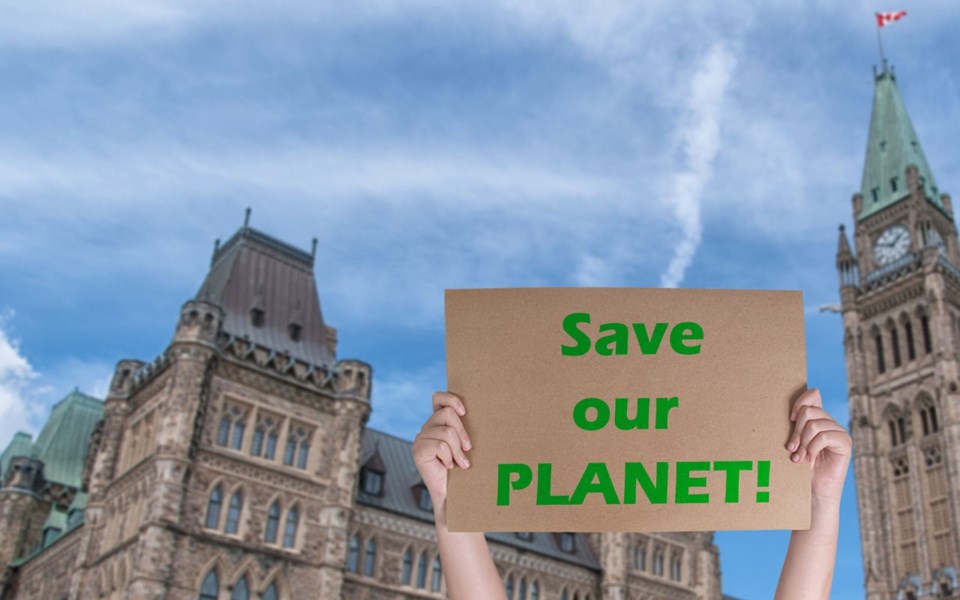There's but one certainty in the coming election: if Conservatives win, the environment loses. And because we are the environment—as informed thinkers suggest—we'll all lose. It's that simple.
According to polls, nature issues (i.e. climate change, pollution, biodiversity) rank among Canadians' top-five voter concerns. Yet conservation isn't an election issue because Conservatives, who command 30 to 40 per cent of the vote, refuse to talk about it.
As the world's second-largest country, Canada's vast habitats serve important global functions, such that changes to environmental policy (i.e. during the previous Conservative government), can affect the entire planet. Yet the same abundance of wilderness delivers a false sense of accomplishment around conservation. With half of Canada's animal species in decline and a fifth at risk of extinction, we're clearly not doing great. Among the drivers of decline: ocean warming and acidification; habitat loss through land conversion by resource development and climate-driven pest outbreaks, permafrost loss and fires; and water pollution. The past four years have seen incremental improvements in these—some big, some small—but all would be washed away under the deregulation and slash-and-burn cuts of a conservative government (i.e. Doug Ford's Ontario).
The environment isn't part of the Conservative conversation because this is a political brand no longer deserving of its title, so far has it migrated from philosophical underpinnings. In fact, today's Conservative blend of populism and unbridled free-marketeering is more in line with the Libertarian visions of Ayn Rand (to whom top Republicans, the Koch brothers, and even Stephen Harper have pledged allegiance), and comes with the same stark, binary mindset of us-versus-themism. Under a façade of freeing individuals from the evil restraints of government or cooperative social progress—while holding out never-to-materialize cash carrot-sticks—today's conservatism enslaves voters in institutionalized ignorance, inaction, and jingoism. Look around (i.e. U.S., UK, Alberta). I'm not making this up.
Today's conservatism relies on leveraging false notions of economic collapse (i.e. the economic sky is falling despite Canada leading the G7 in key indicators), empty promises of personal enrichment (no measurable demonstration exists), fantasies of moral certitude (Conservative politicians are charged and convicted of illegalities at a far higher rate than all other political stripes combined), and a deep rooting in the misanthropic soils of self-interest (everyone else is out to take something from you or your family).
Exacerbating these troglodytic concepts is the bipolar spectrum of the Conservative vote: at one end the avarice of those working the levers of the capitalist machine (i.e. oil execs), forever chasing handouts (i.e. tax breaks and deregulation) that will further concentrate money and power in the hands of a select few; at the other end, an uncritical roused rabble (i.e. yellow vesters), whether it stems from laziness, lack of education, religiosity, misplaced anger (Conservatives are triggered with comical ease), the reactionary buying-into of malicious ad hominem attacks (no other party vilifies other leaders like Conservatives), or unsubstantiated knee-jerk fears over immigration, taxes, jobs, crime, ethics, or the economy.
More dangerously, backed by globalist financial interests, Conservatives will now do anything to gain power, a usurpation of democracy unseen among progressive parties. Don't believe it? Fact-check the collateral offered by each federal Canadian party on Twitter. Virtually everything emanating from Conservative camps is an outright lie, distortion of facts, or carefully curated misinformation. To claim non-existent moral high ground through a titanic act of transference, Conservatives also now label anyone concerned with social or environmental justice (no matter their party) "radicals." Such subjects are in no definable way radical in nature; they're academic, fact-based, practical, and centrist in their leanings. Not so today's conservatism, a constantly fissioning milieu of self-devouring jackals characterized by radical factions that roil against any centrist drift as not conservative enough. Again, look around: #RWNJ splinters like the U.S. Tea Party, and, in Canada, the Reform, Alliance, Heritage, Wild Rose, and People's parties—each bastions of fundamentalist, homophobic, anti-immigrant, and candy-coated Libertarian sentiment. Have any come to power? Actually, yes. After ultimately recognizing their vote-splitting, right-wing factions—always reluctantly—posse up again (i.e. Conservative Party of Canada, United Conservative Party) with backroom promises of further-right policies, then slipped into the mainstream via opacity and electoral trickery (i.e. see CPC convictions, current investigation of the UCP).
Amidst such malfeasant calculus, whither room for ecological thinking? We know that caring for the environment boosts the economy and generates jobs, but we also know more transformative change is required. The odds of getting better action on the environment from a government already engaged in it are far better than the odds of getting anything from a government that demonstrably doesn't care.
Leslie Anthony is a science/environment writer and author who holds a doctorate in reversing political spin.




